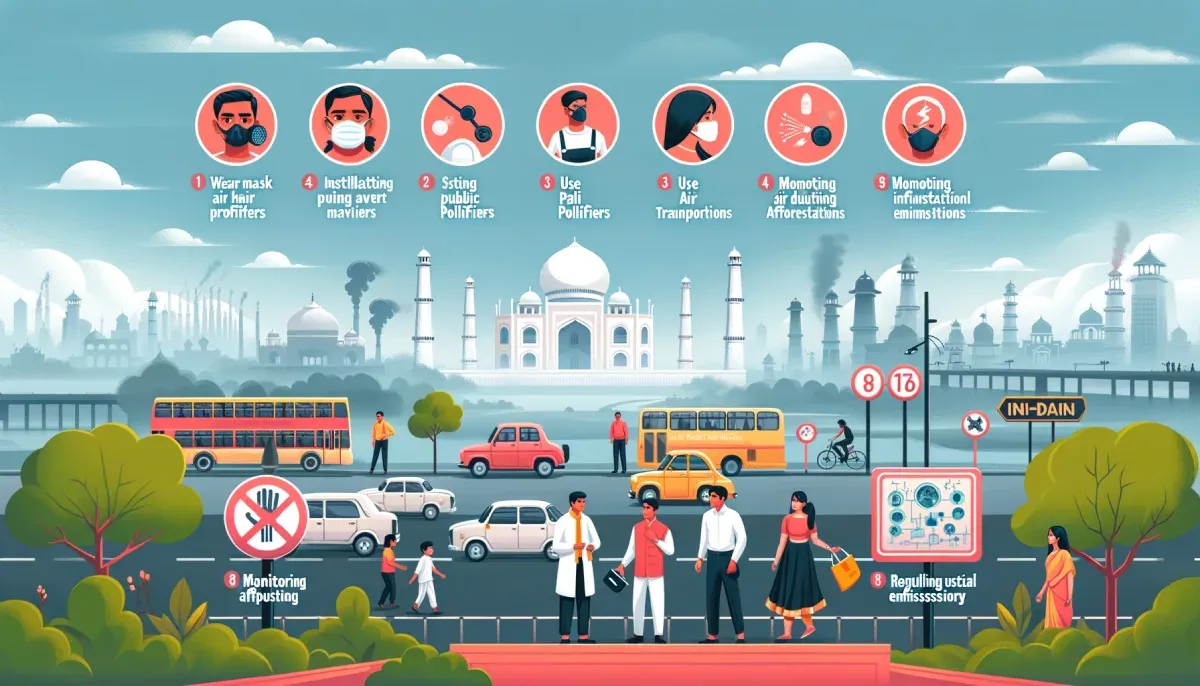

Air pollution in India isn't just a topic of environmental concern; it's a pressing health emergency. With cities often blanketed in smog, it's crucial to know how to shield ourselves from its harmful effects. Here's a list of ten essential precautions that can help you breathe easier and live healthier in India's challenging air quality.
What to Do: Regularly check the Air Quality Index (AQI) through reliable websites or mobile apps.
Why It Helps: Knowing the AQI can help you plan your day, avoiding outdoor activities when pollution levels are high.
What to Do: Schedule outdoor exercises during early morning or late evening hours.
Why It Helps: Pollution levels tend to be lower at these times, reducing your exposure to harmful pollutants.
What to Do: Wear N95 or higher-grade masks when stepping outside.
Why It Helps: These masks can filter out most airborne particles, protecting your respiratory system.
What to Do: Keep windows and doors closed on days with high pollution levels.
Why It Helps: This simple action can significantly reduce the amount of polluted outdoor air entering your home.
Also Read:- Top Polluting Cars in India
What to Do: Use air purifiers, especially in bedrooms and living areas.
Why It Helps: Air purifiers can remove contaminants from indoor air, providing a cleaner breathing environment.
What to Do: Consume a diet rich in fruits, vegetables, and plenty of water.
Why It Helps: Antioxidants in these foods can combat the oxidative stress caused by pollution, and hydration helps in detoxifying the body.
What to Do: Ensure that children, the elderly, and those with pre-existing health conditions wear masks and avoid going out on high-pollution days.
Why It Helps: These groups are more susceptible to the adverse effects of air pollution and require additional precautions.
Also Read:- Expert Tips for Removing Scratches from Car Surfaces
What to Do: Incorporate indoor plants that purify air, such as spider plants and peace lilies.
Why It Helps: These plants can absorb pollutants and improve indoor air quality.
What to Do: Support policies and initiatives aimed at reducing air pollution.
Why It Helps: Collective action can lead to systemic changes, resulting in long-term improvements in air quality.
Also Read:- Most Expensive Cars in India
What to Do: Use public transport, carpool, and promote electric vehicles.
Why It Helps: Reducing the number of vehicles on the road can decrease emissions and improve overall air quality.
Air pollution is not just a statistic; it's a reality that affects millions. The World Health Organization (WHO) has classified outdoor air pollution as a carcinogen. In India, where traditional fuel sources and high vehicle emissions contribute significantly to air pollution, the risk is compounded.
Pregnant women, children, and those with chronic health conditions face a higher risk from polluted air. For pregnant women, exposure to polluted air can impact fetal development. Children's lungs are still developing, making them more susceptible to respiratory infections. Those with conditions like asthma or cardiovascular diseases may experience exacerbated symptoms.
A diet rich in antioxidants can help the body fight the damage caused by air pollutants. Foods like berries, nuts, and green leafy vegetables are excellent choices. Hydration facilitates the elimination of toxins absorbed from polluted air, making water intake more crucial than ever.
While individual actions are vital, the battle against air pollution requires concerted efforts at the national and global levels. India's adoption of BS6 emission standards, the push for cleaner fuels, and the development of robust public transportation networks are steps in the right direction. The proposed vehicle scrappage policy could further accelerate the removal of older, more polluting vehicles from the roads.
The air pollution crisis in India is daunting, but not insurmountable. By taking informed and proactive steps, we can mitigate its impact on our health. From checking the AQI to advocating for sustainable practices, every action counts. Together, we can work towards a future where the air in India is as rich in quality as its culture.